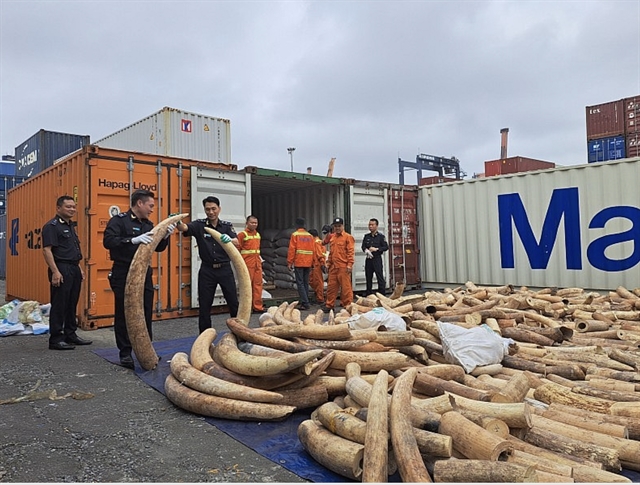 Society
Society


|
| Seven tonnes of ivory are confiscated by Hải Phòng City's Customs in March. Photo congthuong.vn |
HÀ NỘI — The illegal wildlife trade is low risk but highly profitable, which makes wild animals, especially endangered, precious and rare species, in danger of falling to the brink of extinction, said Bùi Đăng Phong, vice director of the Endangered Wildlife Project of the World Wild Fund for Nature (WWF) - Việt Nam.
The wildlife trade has become complicated in many countries, including Việt Nam, Phong said at the forum Strengthening the Participation of Journalists in Preventing and Combating Illegal Wildlife Trade co-organised by the WWF-Việt Nam, TRAFFIC International, USAID and the Việt Nam Agriculture newspaper in Hà Nội on Tuesday.
According to Phong, the illegal wildlife trade is estimated at nearly US$20 billion a year, ranking fourth after drugs, weapons and human trafficking.
The criminals exploit the entire supply chain from poaching to transportation and trade. Other illegal activities are often associated with wildlife crimes, such as money laundering, corruption and forgery, Phong said.
Despite efforts to combat the wildlife trade over the past two decades, Việt Nam remains a global hub for the illegal wildlife trade as both a supplier and a source of demand, he said.
In particular, as Việt Nam has become a middle-income country, the trade in high-value wildlife products has increased.
Wildlife products are usually used as home decorations, symbols of social status, medicine and pets in the country.
The WWF’s Endangered Wildlife Project aims to help Việt Nam control and prevent the increasingly serious wildlife trade by enhancing Việt Nam’s leadership role in combatting wildlife crimes.
Tuesday’s forum was a venue for experts and managers to share information with journalists about the current situation of the wildlife trade and expand a network of journalists who are interested and skilled in investigating the wildlife trade.
Speaking at the forum, Dr. Vương Tiến Mạnh, vice director of CITES Việt Nam (CITES is the Convention on International Trade in Endangered Species of Wild Fauna and Flora), said that since 2018, there have been 50 cases of illegal wildlife trading investigated and taken to court.
Police have confiscated 40,000kg of pangolin scales, 20 tonnes of ivory, 500kg of rhino horns, 17 tigers and seven cubs.
The trade in wild animals and plants has become more serious to meet the high demand of both domestic and international markets, said Mạnh.
Although Việt Nam has a system of policies and legal documents on wildlife management, it is still very difficult to handle violations of regulations on wildlife protection, especially limitations in information dissemination, he said.
According to the vice director, when China decided to close the domestic ivory market in 2020, a large amount of ivory was imported into Việt Nam to be processed and sold to international or domestic tourists.
Profits in the wildlife trade are very high, while the approach to the issue varies among regulatory and enforcement agencies, organisations and institutions, he said.
Network of investigative reporters in wildlife trade crimes
Combatting the wildlife trade has faced many difficulties because the priority level of controlling illegal trade in wild animals and plants is not high in some agencies and localities, and the capacity to investigate, identify, apply technology and share information among wildlife law enforcement officers is still limited.
Information dissemination and communication to people about wildlife protection is one of the important solutions to prevent and combat the illegal wildlife trade.
At the forum, journalists and reporters pledged to participate in combating the illegal wildlife trade.
Lê Trọng Đảm, deputy Editor-in-Chief of the Việt Nam Agriculture newspaper, said that one of the keys of the Endangered Wildlife Project is to consolidate and expand the network of reporters investigating wildlife crimes and promote the efforts of the State and private sectors in the fight against wildlife trade in order to detect and report on wildlife crime.
Joining the network, investigative reporters on wildlife crime will receive training on knowledge and investigating experiences in the illegal hunting, capture, trade, transport and use of wild animals, especially endangered wild animals, Đảm said.
The training will help raise awareness and strengthen the capacity of reporters regarding the legal framework and policies on wildlife conservation, he said. VNS




